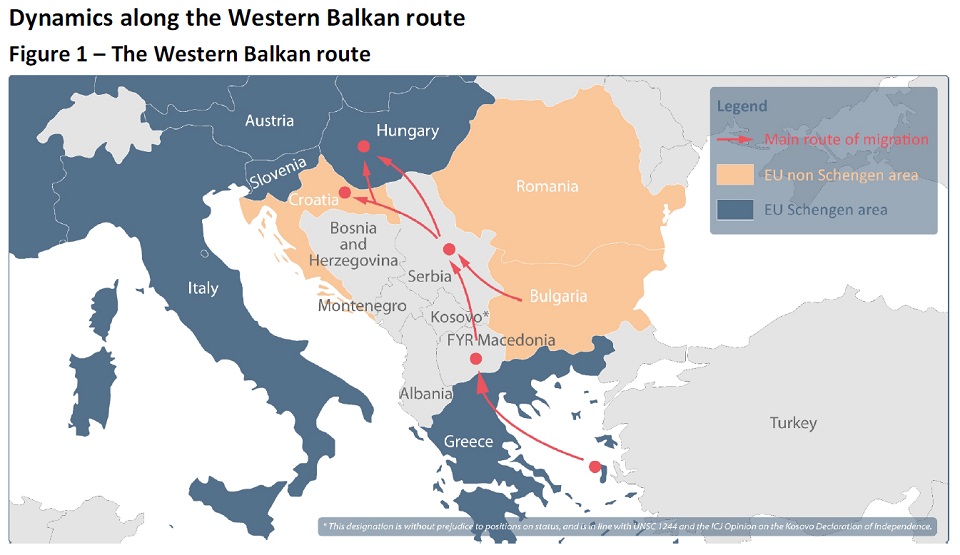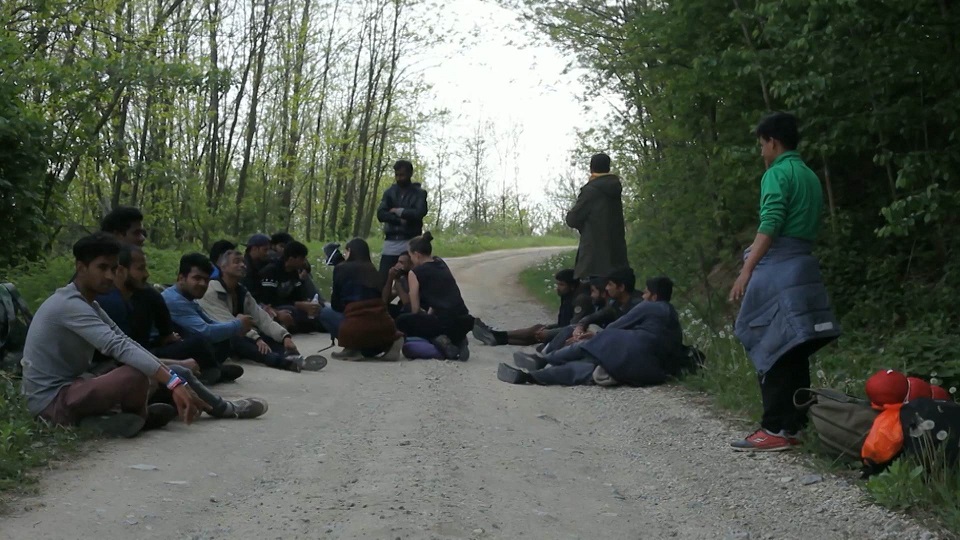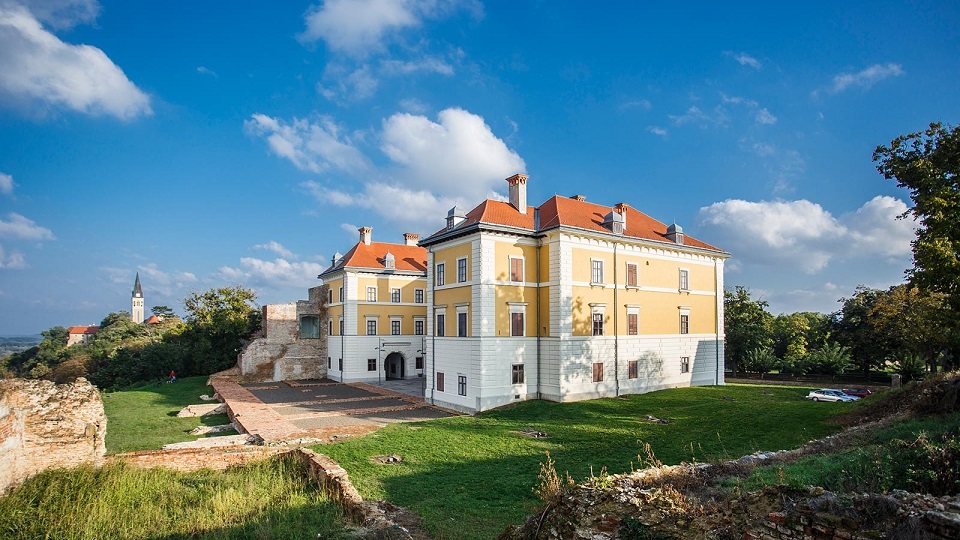Twice as Many Illegal Migrants Reported on Balkan Route as Last Year - Večernji List
ZAGREB, 24 June 2021 - Migratory pressure on Europe is increasing again as the number of people illegally crossing the external borders of the European Union in the first five months of this year reached 47,100, which is an increase of nearly 50 percent compared with the same period last year, Večernji List newspaper said on Thursday.
On the so-called Balkan route, 14,734 illegal attempts to cross the border were reported this year, or 104 percent more than at the same time last year. The Western Balkan countries reported 2,900 such attempts in May, which is twice as many as in May 2020. Most of the illegal migrants using this route come from Syria and Afghanistan.
These are the preliminary data released by the EU border and coast guard agency Frontex, which attributed the increase in numbers to the fact that the borders, which were closed last year because of the COVID-19 outbreak, are now being reopened.
The greatest pressure still comes from the Central Mediterranean route as nearly 4,200 migrants used this route to get to Europe in May, nearly twice as many as at the same time last year. Between January and May this year the number of illegal crossings on this route more than doubled, reaching 15,700.
Croatia lies on the Balkan route, with most migrants using it as a transit country on their way to other destinations in the EU. Even most asylum seekers, who arrive in Croatia from refugee camps in Greece and Italy under an EU relocation program, leave. Of 250 resettled persons whom Croatia accepted as part of the EU solidarity mechanism, 67 or 26.4 percent have stayed in Croatia.
That migrants do not see Croatia as their destination but only as a barrier on their way to other destinations is shown by the fact that Slovenia returned 9,871 illegal migrants to Croatia last year and 607 in the first four months of this year.
Croatia has seen an increase in the number of migrants illegally crossing its border this year. In the first quarter of 2021, 3,267 such cases were registered, which is at last year's levels, while compared with May 2019 their number increased by 17 percent. Most of the illegal migrants come from Bosnia and Herzegovina, which is finding it increasingly difficult to cope with the burden of migration, Večernji List said.
For more news about Croatia, visit our dedicated page.
Croatia Border Town Shaken By Migrant Burglaries: Ilok Locals Live in Fear
While EU politicians, leaders, foreign journalists and human rights organizations play political football, assign blame and discuss solutions for the migrant crisis along the Balkan Route; frightened residents of Croatia border towns, like the town of Ilok, are locking themselves in their homes at night out of fear of burglaries and much worse.
“We are scared! In the middle of the night, we caught migrant burglars circling our house. I thought my son was going to work, but sensed something suspicious and saw two masked people at our front door,” reported one shaken Ilok local.

(Note that Hungary has built an electric fence spanning its border, which has halted migration.)
Croatia Police Not Publicly Reporting Ilok Migrant Burglaries
In the Fall of 2015, during the great migrant crisis, more than half a million migrants passed through Eastern Croatia on their way to more economically desirable Western European countries. Not a single major incident, or even any minor incidents, were reported during the entire relocation process. However, four years later, locals in some border towns in the same part of Eastern Croatia are living in fear, according to Branimir Bradarić/Večernji List on January 25, 2020. Migrants are entering their towns and villages and burglarizing shops, and a recent attempt was even made to break into a house. There have been also reports of car theft and one incident ended with a car accident in which several migrants were injured while trying to escape authorities in a stolen vehicle.
All this has happened over the last half year but there were signs of trouble even before then. However the police have avoided discussing these burglaries in their regular reports the media. Therefore, frightened residents have decided to go public with these incidents on their own. The situation has deteriorated most notably in the Eastern Croatia city of Ilok, where residents are no longer willing to remain silent about their fears for safety in their own homes.
Frightened Ilok Residents Reporting Migrant Burglaries Directly to Media
The last in a series of frightening events occurred ten days ago when two migrants, dressed in dark hooded jackets, tried to break into the home of the Lončar family in Ilok. Remembering that day, Irjana Lončar recalls hearing noises around 4:30am.
“We were sleeping when I heard noises in the yard and by the door. It sounded like someone was walking nearby and I thought it was my son leaving for work. But the lights were off, which was strange, so I got up to see what was happening. At that moment, I saw two unfamiliar masked people at our front door. They were trying to force our door open by destroying the lock with a device, which I think was a drill. I started screaming and yelled for my husband, but the two burglars had escaped by then,” recalls Lončar, who was still trembling with fear.
Since the lock was destroyed, her husband could not get the front door open immediately. After succeeding, he jumped into their car and tried to follow the migrant burglars. Irjana watched from the window as the pair fled down the road. Later, she discovered that the burglars had also been trespassing in their yard and had broken into their attic, where they stole two knives and a knife sharpener. They swiped the Lončar’s New Year's light decorations and made off with her husband's hunting backpack. Then she discovered that the pair had tried to open the kitchen window with a sharp object to enter the house from there. Police responded to her call for help very quickly, but by that time the migrants had long vanished into the darkness.

Ilok Residents Concerned for Safety and Property
“I'm really scared now. From that day, my life has not been the same. I have a difficult time sleeping and am always on the alert for unusual noises. Every little noise will jolt me wide awake as does the sound of barking dogs. I'm afraid that they'll try to break into my house again. And, I'm particularly scared because nobody knows what these people are prepared to do. Nor does anyone know what they would have done if they had entered our house, or how it all could have ended. We just want to feel safe in our town again, and especially safe in our own home. Unfortunately, that's not the case anymore,” Lončar admits.
She adds that, after their burglary, they started hearing about several similar break-ins throughout town – and other locals have witnessed migrants breaking into homes. She claims that there are currently several unoccupied houses in Ilok, and migrants are breaking into them so they can hide temporarily before continuing their journey further into the interior of Croatia and the rest of Europe.
The Ilok locals have also reported finding discarded clothing all over town as migrants change their clothes before continuing their journey westward. There have also been reports of migrants crossing the border and continuing down the road before they are caught by police.
Ilok Break Ins and Burglaries Widespread
Jadranka Tomašić’s shop has also been hit by migrants. They have succeeded in burglarizing her shop in two out of three attempts. In both of those cases, according to Tomašić, they stole certain brands of cigarettes, some alcohol and Nescafé. About 20,000 HRK (2687 EUR) of merchandise has been stolen from her shop, and the front door of her store was damaged too. They also ran off with all the cash they found.
“I do not feel safe here anymore, and I am not the only one. Other Ilok residents don’t feel safe in their town either. In addition to everything else, you can see the effects of fear in front of elementary schools at the end of the school day. Parents are now coming to school in cars to pick up their children. People are locking themselves in their homes before dark and are avoiding going out in the evening. No matter how you look at it, the situation is not at all simple or straightforward,” Tomašić reveals with concern.
She adds that in addition to the burglaries in her shop, there have been burglaries in the suburban settlements of Bapska and Šarengrad. After the burglary in Šarengrad, the perpetrators were apprehended. After one of the burglaries at her store, a large knife was found, which was to be believed to have belonged to migrants. She also recalls a situation that occurred last summer when a migrant tent was found in a corn field across the street from her store, during the corn harvest. It was in a populated part of Ilok and nobody aware of that it was there until the harvest.

‘We just want to live and work normally’
“We just want to live and work normally, but that's not the case now. The worst part is that feeling of insecurity. These people have shown no fear, and that is why we are very afraid. It really bothers me that nobody is talking about this. I have no objection to the job the police are doing and do not expect that they, or the mayor, will be able do something overnight. They cannot do anything because they do not have the necessary tools, but this problem must be addressed in a systematic way,” Tomašić points out. She adds that many locals have been reporting burglaries, including those who have had their safes broken into and contents stolen.
The well-known Ilok agronomist and winemaker Ivan Buhač was also hit by migrants, but he managed to avoid burglary. He left his unlocked vehicle parked outside his house. Someone entered it and wanted to start it up and drive off. As the keys were not inside; they emptied the vehicle in search for the keys. However, the car itself was undamaged.
“The fact is that these incidents, which are extremely unusual for Ilok, happen regularly now and so it's not surprising that people do not to feel safe. Recently, burglaries and attempted burglaries have been reported in people’s homes. We all hope that this will all end soon and that we can go back to living normally, because this is not definitely the case now,” Buhač admits.
Commenting on recent events, Ilok Mayor Marina Budimir says the city authorities are aware of the problem and are in constant contact with the Croatia Interior Ministry and police in Ilok.
Ilok Police and Mayor: No Reason to Panic
“Everyone is working as hard as they can to resolve this problem, but I don't think there is any reason to panic. The problem is very present, and it’s important to compare how our residents live now as opposed to before: how they move about in town and go to work and school. Unfortunately, this problem in Ilok will continue since we are right on migrant route through Croatia from Serbia and beyond. Another problem is that the migrant camp in Serbia is located near the border crossing. Migrants are housed there, but they can leave the camp freely. That's why this is happening,” says the frustrated mayor.
She is also quick to point out that she has demanded increased police surveillance of the border and adds that there haven’t been any reported attacks on residents so far. The mayor also indicates that movement over the eastern border will be harder to detect as vegetation begins to grow again, which will make monitoring more difficult. Nevertheless, police have surveillance equipment in place. Indeed, police patrols are more visible in Ilok and the surrounding area. Unofficial reports from the police indicate that the border has been steadily monitored for months, and that the burglaries and break-ins in Ilok are indeed a problem, but they do not consider this problem dangerous because there haven't been any reports of violence or threats.
Croatia Police Point Out Two Types of Migrants
They also explain that the two types of migrants should be distinguished. There are passers-by who are trying to somehow cross the border illegally and move on. The others, who are thought to be causing the problems in Ilok, are located along the border crossing at the camp in Principovac, which they consider to be the main issue. They can move freely in that camp, and illegally cross the Croatian border to steal from locals so that they can raise money for travel to the West.
The stolen goods are then resold at the migrant camp, which was confirmed by the recent case of two migrants who were arrested after breaking into a shop in Šarengrad. After that, police claim, the burglary indicents stopped. Officers understand the Ilok residents’ sense of insecurity but say that there is absolutely no reason to panic and that the police are on the ground doing their job.
Follow our Politics page for updates on the migrant crisis in Croatia.


